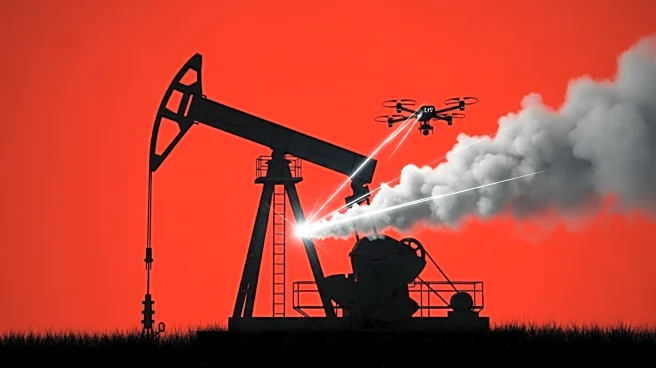What's Happening?
Ukrainian forces have conducted drone strikes on Russian oil refineries, leading to significant gasoline shortages in Russia and occupied Ukraine. A recent attack targeted the Tyngovatovo Oil Pumping Station in the Chuvash Republic, causing a fire and halting operations. This has exacerbated fuel shortages, particularly in the Far East, Belgorod Oblast, and Crimea. The Russian government, which traditionally uses subsidies to stabilize domestic gas prices, is facing challenges due to these disruptions. Reports indicate that fuel prices have surged, with some areas experiencing prices as high as $3.70 per gallon. Additionally, fuel purchases are being limited in several regions, including Moscow and Leningrad.
Why It's Important?
The ongoing fuel shortages in Russia highlight the strategic impact of Ukrainian drone strikes on Russian infrastructure. These disruptions not only affect the Russian economy but also have broader implications for the ongoing conflict. The increased fuel prices and limited availability could strain the Russian military's logistics and operational capabilities. Furthermore, the situation underscores the effectiveness of Ukraine's military strategy in targeting critical infrastructure to weaken Russian resolve and support. The economic strain on Russia may also influence public opinion and political stability within the country.
What's Next?
As the conflict continues, further Ukrainian strikes on Russian infrastructure are likely, potentially leading to more severe economic repercussions for Russia. The Russian government may need to explore alternative strategies to mitigate the impact of these disruptions, such as increasing domestic production or seeking new supply routes. Additionally, international responses, particularly from Western allies, could play a role in shaping the conflict's trajectory. The situation remains fluid, with potential for escalation if fuel shortages persist and public discontent grows.
Beyond the Headlines
The use of drones in modern warfare represents a significant shift in military tactics, allowing for precise strikes on critical infrastructure with minimal risk to personnel. This development raises ethical and legal questions about the conduct of war and the protection of civilian infrastructure. The international community may need to address these issues through updated regulations and agreements to prevent further escalation and ensure compliance with international law.











